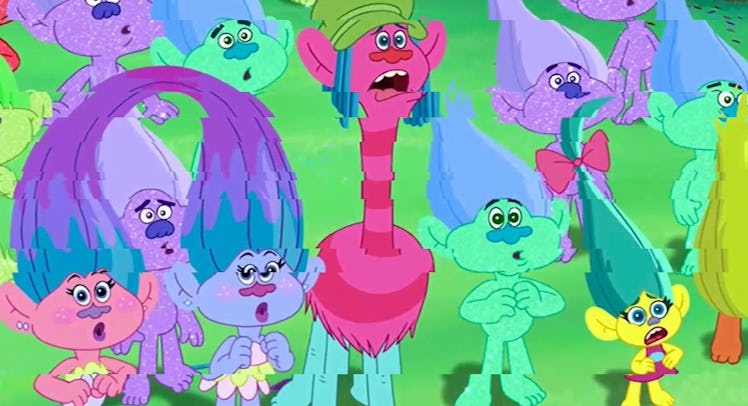Netflix’s ‘Trolls’ is Oddly Brutal and Shockingly Political
The Trolls treat every day like paradise despite the fact that they are constantly on the brink of total annihilation.

On its surface, Trolls: The Beat Goes On is not a complicated show. The Trolls are fun-loving, song-singing creatures that bust moves and make friends at every turn. In every episode, Poppy or Branch, the two main Trolls, get themselves into some kind of trouble then resolve the situation in between 10 and 12 minutes. Naturally, this gives the whole thing a low- to no-stakes feel. But here’s the thing. Trolls is not just another Netflix kid’s show. It’s actually incredibly dark and, in a sense, incredibly timely. The threats Poppy, Branch, and the bunch face are fundamentally existential and often run parallel to real threats that keep parents awake.
In the show’s debut episode, Queen Poppy brokers a peace agreement between the Trolls and the Bergrens and then plans a party to celebrate the end of their long-held rivalry. But the other Trolls think a party might not be the best idea because the Bergrens have an unfortunate history of eating Trolls. Poppy treats these extremely valid concerns like hearsay. When the Bergrens show up and it becomes clear that some of them are hungry for Troll meat, Poppy remains welcoming.
Is this a political allegory? Hard to say because it’s so loose. Liberals might interpret it as a critique of naive Russia policy in the age of information warfare. Conservatives might interpret it as a critique of open immigration for Muslims. Either way, it feels relevant because the Trolls that follow Poppy wind up looking at their leader in bafflement, wondering if they’re being gaslit.
The episode is trying to teach kids the importance of not allowing differences to keep you from connecting with others. That’s nice, but, you know, also pretty questionable given the context. It feels like moral for children is very thinly painted over a takedown of moral relativism if not neoliberalism. It’s worth noting that the fact that everything works out for Poppy doesn’t mean she’s right. Poppy treats the Bergren’s murderous intent like a minor character flaw because it suits her worldview.
The second part of the episode offers no relief for the poor Trolls as their village is stuck in the middle of a severe drought. The always level-headed Branch warns Poppy that the Trolls are in desperate need of rain to survive but Poppy once again fails to grasp the severity of the situation and mocks Branch for being such a worrywart. Branch ends up befriending a talking cloud that controls the weather in order to bring back the rain but Poppy once again doesn’t seem to care that the Trolls narrowly survived total destruction. She’s just happy Branch made a new friend.
Are parents watching this over little shoulders supposed to consider global warming? It seems almost impossible that such a storyline would arise without that explicit intent. One must work hard to un-see the environment message, which is definitively unsubtle: Do nothing at your peril.
Through the eyes of the eternally upbeat Poppy, these are just fun wacky adventures. But if you take a step back, you quickly realize that Poppy is actually bopping happily from existential threat to existential threat. Typically, kid’s shows treat low stakes situations like they are a matter of life and death in order to manufacture drama without getting too real or heavy. Trolls does the opposite in a subtly subversive way. For Poppy, throwing a fun birthday party for Branch is much scarier than possibly being eaten by a hungry Bergren.
Are Poppy’s bizarre priorities meant to serve as a statement on the relentless positivity that has become a staple of kid’s entertainment? Are they a critique of the form over substance nature of current political discourse? It’s a bit unclear because the show still prioritizes fun. That’s ultimately good — kid shows should be for kids — but also baffling.
Trolls treats the constant threat of death with a jarring sense of levity. Could this strange inconsistency in tone and story be leading towards an incredibly dark ending where the Trolls’ luck runs out and they are all finally killed? That seems unlikely only because Dreamworks doesn’t mess around with valuable IP. In the world of the Trolls, that seems distinctly possible. One must assume this makes the Trolls nervous between songs. Wonder what that’s like.
This article was originally published on